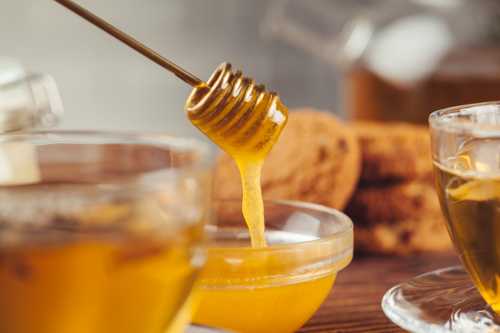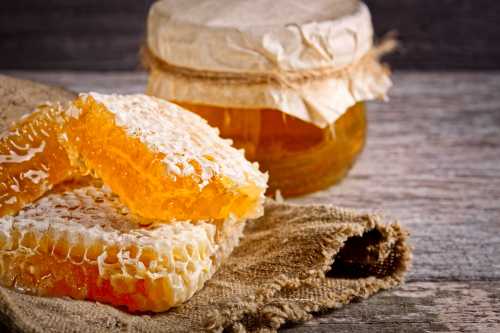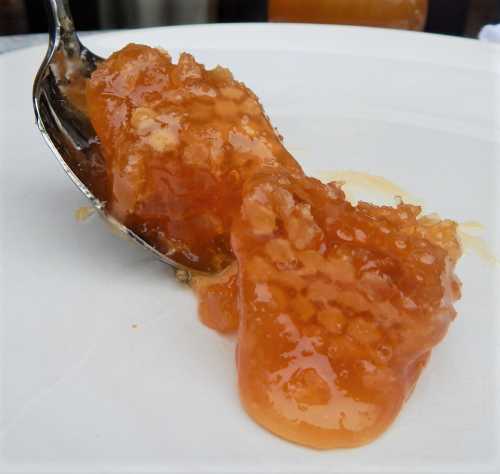Can You Be Allergic To Honey?
Several years ago, I wrote a page about the use of honey for treating allergies. However, (and especially if you suffer from allergy to pollen) you may be wondering whether it is possible to be allergic to honey.
This is a legitimate concern, given that honey is made from nectar gathered by bees from flowers.
The short answer is:
Yes – it is
possible to be allergic to honey and to experience typical symptoms of allergic
reaction (even anaphylaxis in extreme cases) after eating honey. However,
allergic reactions caused by eating honey are very rare.
There are a number of case studies describing such incidences.
What Causes Honey Allergy?

It is thought that allergy to honey can
be caused by two things:
- allergy to the pollen content of honey, or
- allergy to bee proteins present in the honey1.
A study by Bauer2 in 1996 of 23 patients who exhibited allergic reaction to honey consumption ranging from mild itching to anaphylaxis demonstrated this quite clearly – proteins secreted by honey bees (from the pharyngeal and salivary glands in the head) and proteins from any pollen within the honey were the causes of allergy to honey.
Can Allergy To Honey Cause A Severe Reaction (Anaphylaxis)?
Yes. Vezir et al3 in 2014 described 6 patients who had systemic allergic reactions after eating honey – three of them suffering anaphylaxis.
Honey-specific immunoglobulins (specifically IgE – the primary protein produced by the body that leads to the allergic reaction symptoms) were found in all six patients – so the honey was producing a genuine allergic response.
What are the symptoms of honey allergy?
The allergic response to honey can vary from very mild to very severe.
At the mild end of the spectrum, symptoms might include mild itching within the mouth, or mild itching of the skin.
Some people have experienced more severe skin reactions after eating honey – urticaria or pruritis, for example.
In the event of anaphylaxis after eating honey, this is an emergency, and immediate medical intervention is required. Anaphylactic reaction is a potentially life-threatening condition. Seek emergency assistance if any of the following symptoms occur:
- swollen tongue
- difficulty breathing
- feeling of tightness in the chest
- trouble swallowing or speaking
- dizziness or feeling faint
- collapse.
Can local artisan honey cause allergy?

Yes, particularly if unfiltered to remove pollen. Di Costanzo et al1 reported a case of anaphylaxis in a five-year-old boy after eating an ‘artisanal’ honey.
The vast majority of commercial honey offered for sale at the average retail store is filtered and pasteurized so that most of the pollen is reduced, but this would not be the case with an artisan honey.
Does this mean I shouldn’t eat honey if I’m allergic to pollen?
Perhaps not.
A study by Helbling4 in 1992 of 22 patients with a history
of systemic allergic symptoms after eating honey, showed that pollens in the
honey were responsible for a high proportion of the allergies.
For example, 75% of the sample were allergic to dandelion pollens, and 59% allergic to pollens from the
Compositae family – a family of plants that includes over 32,000 flowering
plant species.
So the suggestion is that subjects with a known allergy to a wide range of plant pollens have a higher likelihood of suffering an allergic reaction after eating honey.
Can royal jelly cause allergic reactions?
There have been case reports of allergic reactions after eating royal jelly. Katayama et al5, Takahama6, and Harada7 have all reported cases of anaphylaxis caused by royal jelly.
So the answer is: yes – eating royal jelly can cause allergy and anaphylaxis.
References:
1. Di Costanzo M, De Paulis N, Peveri S, Montagni M, Berni Canani R, Biasucci G. Anaphylaxis caused by artisanal honey in a child: a case report. J Med Case Rep. 2021 May 14;15(1):235. doi: 10.1186/s13256-021-02823-4. PMID: 33985563; PMCID: PMC8120922.
2. Bauer L, Kohlich A, Hirschwehr R, Siemann U, Ebner H, Scheiner O, Kraft D, Ebner C. Food allergy to honey: pollen or bee products? Characterization of allergenic proteins in honey by means of immunoblotting. J Allergy Clin Immunol. 1996 Jan;97(1 Pt 1):65-73. doi: 10.1016/s0091-6749(96)70284-1. PMID: 8568139.
3. Vezir E, Kaya A, Toyran M, Azkur D, Dibek Mısırlıoğlu E, Kocabaş CN. Anaphylaxis/angioedema caused by honey ingestion. Allergy Asthma Proc. 2014 Jan-Feb;35(1):71-4. doi: 10.2500/aap.2014.35.3718. PMID: 24433600.
4. Helbling A, Peter C, Berchtold E, Bogdanov S, Müller U. Allergy to honey: relation to pollen and honey bee allergy. Allergy. 1992 Feb;47(1):41-9. doi: 10.1111/j.1398-9995.1992.tb02248.x. PMID: 1590566.
5. Katayama M, Aoki M, Kawana S. Case of anaphylaxis caused by ingestion of royal jelly. J Dermatol. 2008 Apr;35(4):222-4. doi: 10.1111/j.1346-8138.2008.00448.x. PMID: 18419679.
6. Takahama H, Shimazu T. Food-induced anaphylaxis caused by ingestion of royal jelly. J Dermatol. 2006 Jun;33(6):424-6. doi: 10.1111/j.1346-8138.2006.00100.x. PMID: 16700835.
7. Harada S, Moriyama T, Tanaka A. [Two cases of royal jelly allergy provoked the symptoms at the time of their first intake]. Arerugi. 2011 Jun;60(6):708-13. Japanese. PMID: 21709438.
Did You Know?
Toxic Honey Was Used In Ancient Warfare!

